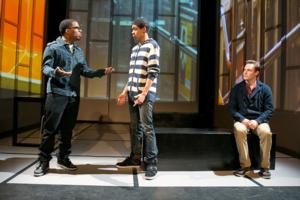
Luke Harlan is an educator, performer, and, most notably, the director of The New York Times Critic's Pick "Honky", returning for its second run at Urban Stages. The play offers a darkly comedic look at the intersections between race, advertising, and commercialism in this country, told through the fallout of a murder of a black teenager over his 'Sky Max' sneakers -- an event which causes sales to triple among white teens.
Harlan has developed new plays at The Public Theater, New York Theater Workshop, Tectonic Theater Project, and The New Group, to name but a few. He is also the founding Artistic Director of Brooklyn-based theater company Engine Company No. 11. Currently studying at Yale School of Drama for an MFA in Directing, this mature artist spoke with StageBuddy about what it's like to remount a play, his theater company, and why he creates art.
StageBuddy: What's unique about "Honky"?
Luke Harlan: This play tackles the subject of racism from a point of view that we aren't used to -- through advertising, and marketing, and commercialism in our world. One thing about this play that hasn't really been seen before is a black character who is dealing with issues of white guilt. We see how these different people, black and white, all experience this same issue: racism in America, racism in all their walks of life. We see them dealing with their own ideas about it as their lives move forward.
Who would most enjoy the play?
That's a difficult question. What we've seen is people of all backgrounds and ages have enjoyed the play. It's not just for one particular group of people -- our audience has been incredibly diverse. I've seen much older people laughing, much younger people laughing. The audience is anyone and everyone.
What character do you feel like you closely relate to?
There isn't one character I relate to the most. As a white man, I see a little more of myself in Peter but [that's] not to say I don't see myself in Thomas or Emilia or even Andy. That's why this play works so well for a range of audiences because everyone can see part of themselves in someone, or a range of people, in the play.
What is it like to remount the play?
It's a really exciting experience to remount the play; you don't often get that opportunity. The most amazing thing about it is you get more time to dive deeper into the play. With "Honky" it's been great. A lot of times, especially in the first mounting of the play, the focus is on making sure that the tone, the pace, and all that is correct for the comedy of the show. Since we got that down in the first run, this time we got to go deeper into these characters and flush out the real truth behind them, what they're going after, what they really need. I think this run of the play has a lot of heart as well as comedy.
 What has your experience working with Greg Kalleres been like?
What has your experience working with Greg Kalleres been like?
Phenomenal. Greg is fantastic, he is an incredibly generous playwright. From the moment we first spoke we developed a psychic connection. It's a great partnership: we both have the same sense of humor, we both understand what this play needs. It needs the right tone to land correctly -- I understood that when I first read it. I can't wait to work with him on more plays.
What's your experience working at Urban Stages?
They are a wonderful company at the forefront talking about diversity of theater and diversity in the arts community in New York. Their mission is to represent on stage what our country actually looks like, which is becoming more and more of a melting pot. They are very generous and supportive of their artists.
Tell us about Engine Company No. 11.
Engine Company 11 has been around for two years, located in Brooklyn and creating devised theater. Our mission is tackling epic questions on an intimate scale -- taking a look at the big questions in the world that are being asked, especially in the realm of science. We are a young company continuing to develop work -- a little less now that I'm in school, but we'll have more work coming soon.
When did you decide you wanted to be a director?
I started directing my junior year in undergrad. I was an actor for quite a while and had a professor who encouraged me to try directing. She might have seen something in my work that she thought might be a director's eye. I always tended to look at plays not from a character viewpoint but from the larger perspective of the play. She told me to give it a try and I did, and I fell in love with it.
Why do you create theater?
I see theater as one of the most important, exciting art forms. It's exciting to gather communities together in one room and have a shared experience, different from film. In film, people gather in a room but no real conversation happens. Theater is the only art form where different communities gather together along with the theater maker in a communal experience -- which can lead to terrific engaging conversations.
"Honky" is a play that really generates conversations; some people may see it as a controversial piece. People start asking questions about the play. It raises questions, everyone after the show wants to talk about it. They want to negotiate how they were feeling and how others will feel about it.
For more information on "Honky", check out our full event listing: https://stagebuddy.com/listingdetail.php?lid=14648
(This interview has been edited and condensed.)